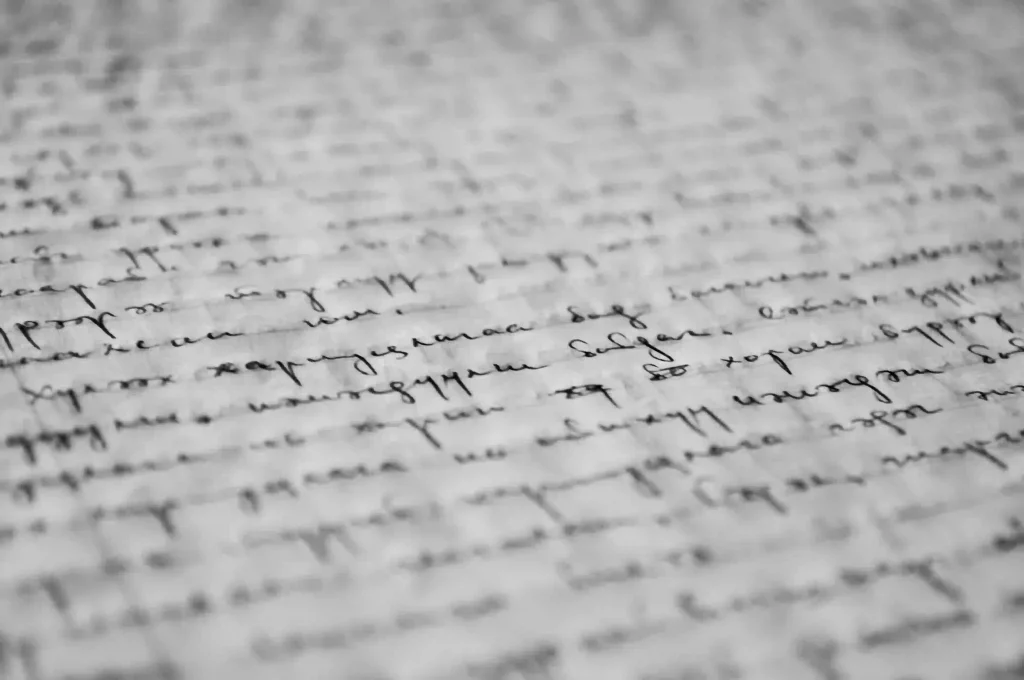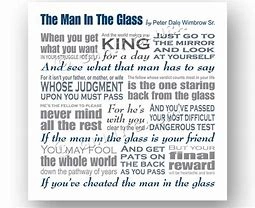The Man in the Glass is a poignant poem that reflects on the importance of self-reflection and integrity. This poem is written by Peter Dale Wimbrow Sr., this timeless piece invites readers to contemplate the true measure of success as seen in one’s own reflection.
Summary
Stanza 01
The Man In The Glass Poem begins with a description of a person standing before a mirror, observing their reflection. However, this reflection isn’t just about bodily appearance. It’s a metaphor for introspection, urging us to think beyond the wall.

This mirror symbolizes self-assessment and it urges us to examine our actions and inner self. It invites us to face our true man or woman, how we look outwardly but how we understand ourselves inwardly.
Stanza 02
Moving past external appearances, the poem dives deeper into self-confidence. Our perception of ourselves determines our real value, regardless of external evaluations.
It prompts self-reflection, encouraging us to examine our inner emotions regarding our actions, intentions, and morality.
Moreover, this stanza serves as a reminder that private judgment shouldn’t be completely reliant on others’ perceptions but as a substitute for our own assessment of our moves and our values.
Stanza 03
This stanza deals with the importance of self-focus and the position of our moral sense because of the most proper choice of our behavior. It emphasizes the significance of our own moral compass.
Additionally, It reminds us that our sense of right and wrong, even when no one else is around, serves as a guide in making decisions.
The “man in the glass” signifies the significance of self-scrutiny, urging us to keep ourselves responsible for our actions, regardless of external effects.

Stanza 04
Building on the topic of duty, this stanza emphasizes the cost of honesty in self-reflection. It underscores the need to acknowledge each of the tremendous and bad elements of our conduct.
Moreover, the “guy in the glass” is aware of the truth approximately our deeds, urging us to face our flaws and virtues alike. It emphasizes that proper self-appreciation stems from being honest with ourselves and making sure our moves align with our ideas.
Stanza 05
Here, the Man In The Glass Poem stresses the importance of internal over external experiences. It emphasizes that real contentment arises from living authentically, in accordance with our values and beliefs.
It means that searching for validation from outside sources ends with a negative response while finding well within ourselves brings lasting achievement.
The “guy inside the glass” symbolizes the importance of self-approval, derived from aligning actions with personal experiences.
Stanza 06
This stanza touches upon the temporary nature of outside achievements. It suggests that worldly success would possibly fade with time. However, the iconic pleasure lies in keeping non-public integrity.
The “man in the glass” represents a deeper reflection that is going past material accomplishments, emphasizing the long-lasting fee of moral integrity.

Stanza 07
It emphasizes the concept that our own moral standards and moral values are rotated in our actions. The stanza shows the idea that self-judgment holds extra weight the an outside opinions.
Moreover, the “guy within the glass” signifies the necessity of evaluating oneself based on private values and ethics in preference to searching for validation from the external global.
Stanza 08
The poem concludes with the aid of reiterating the significance of self-honesty and integrity in our self-evaluation. It underscores the significance of seeing integrity, honesty, and achievement when reflecting on our lives.
The very last traces the pressure and the need to live lifestyles proper to ourselves, suggesting that genuine contentment comes from aligning our movements with our values, main to an experience of real fulfillment and self-approval.
In essence, “The Man within the Glass” activates us to explore our internal selves, emphasizing self-reflection, integrity, and the significance of residing in alignment with our values to gain lasting fulfillment and self-attractiveness.

Text Of The Poem Man In The Glass
The Man in the Glass
When you get what you want in your struggle for self
And the world makes you king for a day
Just go to the mirror and look at yourself
And see what that man has to say.For it isn’t your father, or mother, or wife
Whose judgement upon you must pass
The fellow whose verdict counts most in your life
Is the one staring back from the glass.He’s the fellow to please – never mind all the rest
For he’s with you, right to the end
And you know you have passed the most difficult of tests
If the man in the glass is your friend.You may fool the whole world down the pathway of years
And get pats on the back as you pass
But your final reward will be heartache and tearsIf you’ve cheated the man in the glass.
The Man In The Glass Poem Analysis
Stanza 01
The man In the glass Poem poem begins with a powerful image of a person watching their reflection in a mirror.
Beyond the real act, this mirror symbolizes self-reflection, prompting introspection and self-examination. It serves as a metaphor for looking past the surface and examining the deeper factors of oneself.
Additionally, This visible imagery captures interest, inviting readers to contemplate the importance of self-focus. It emphasizes the significance of addressing one’s inner self, setting the stage for an adventure of self-discovery and growth.
Stanza 02
While moving from the deep look, the stanza emphasizes the significance of self-esteem and self-notion. It suggests that private assessment should derive from one’s internal feelings and values in preference to external judgments.
In addition, this shift in consciousness highlights the importance of vanity and self-assessment, encouraging readers to prioritize their inner thoughts and feelings over societal expectancies.
It encourages readers to take into account the authenticity of their inner self and improve the impact of inner validation on non-public improvement.
Stanza 03
This stanza deals with the moral aspect of self-assessment, emphasizing the role of one’s conscience as a guiding pressure. It underlines the importance of self-responsibility and moral choice-making.
Moreover, the “man inside the glass” emphasizes the nature of our actions, showing the importance of comparing one’s conduct with sincerity and integrity.
It prompts readers to know their moral compass and has an impact on private values in shaping individual movements.

Stanza 04
Building upon the subject matter of integrity, this stanza stresses the value of honesty and sincerity in self-reflection. It accentuates the significance of acknowledging both strengths and flaws.
By highlighting the importance of maintaining self-recognize through actual self-evaluation, it encourages readers to confront their actions virtually.
This technique reinforces the concept that self-respect stems from a sincere acknowledgment of one’s deeds, fostering a feel of personal responsibility.
Stanza 05
Here, the focus shifts to the pursuit of actual happiness with non-public values. It underscores the idea that achievement arises from living authentically and in accordance with one’s ideals.
This stanza promotes the belief that inner contentment comes from staying true to oneself rather than looking for validation from external sources. It activates readers to consider the importance of self-approval and internal alignment in attaining lasting happiness.

Stanza 06
Additionally, the stanza elaborates on the transient nature of outside achievements and material success. It emphasizes the fleeting nature of worldly accomplishments even highlighting the cost of moral integrity and inner pleasure.
Pairing outside fulfillment with inner fulfillment, it encourages readers to prioritize values that contribute to lengthy-term contentment. It invites contemplation on the significance of lasting values beyond fleeting achievements.
Stanza 07
Here, The Man In The Glass Poem focuses on the significance of private values in self-assessment. It stresses the importance of individual ethical standards and internal judgment.
By emphasizing self-evaluation primarily based on private ethics, it encourages readers to not forget the impact of moral principles on shaping one’s character. The stanza underscores the price of private integrity and moral behavior as guiding ideas in self-reflection.
Stanza 08
In addition, the final stanza reinforces the importance of integrity, authenticity, and self-reputation. It emphasizes the need to view oneself clearly whilst reflecting on lifestyles. By highlighting the importance of integrity and private success, it encourages readers to attempt a sincere self-assessment.
Moreover, the stanza serves as a reminder that authentic contentment arises from living a life aligned with one’s values, emphasizing the significance of self-approval and private success.
Additionally, in the summary, each stanza of “The Man in the Glass” poem gives a wonderful angle on self-reflection, integrity, and private values.
The intensity within each stanza encourages readers to contemplate the significance of moral values and authenticity in their adventure closer to self-discovery and achievement.
Symbols in The Man In The Glass Poem
| Symbol | Meaning |
| The Glass | Symbolizes self-reflection and the honest assessment of one’s actions and character. |
| The Man’s Eyes | Represents personal accountability and the scrutiny of one’s own moral choices. |
| The Man’s Soul | Signifies the deeper, intrinsic values and principles that define an individual. |
The Man In The Glass Poem Themes
Self-Reflection and Introspection
This topic encourages looking inside oneself, inspecting thoughts, and expertise in non-public growth. It’s about exploring who we are beyond the surface.
While think of it as a journey to better apprehend our emotions, minds, and moves. It’s like searching inwards to find out our genuine selves and examine our studies.
Authenticity and Self-Worth
Additionally, this subject matter focuses on valuing ourselves for who we are, now not simply how others see us. It’s about knowing our worth based totally on our own feelings and ideals.
In preference to searching for approval from others. It’s like accepting and valuing ourselves irrespective of external critiques.
Personal Integrity and Accountability
Here, in The Man In The Glass Poem, the focus is on doing what we consider is right and taking duty for our movements. It’s approximately making selections guided by our internal ethical compass.
Think of it as being authentic to our values and owning as much as our selections, even when no one else is looking.
Honesty and Genuine Self-Assessment
This subject emphasizes being honest with ourselves about our strengths and weaknesses. It’s approximately recognizing both the coolest and not-so-true elements of who we are. It’s like looking at ourselves in the replicate and acknowledging our movements and behaviors.
Authentic Living and Inner Fulfillment
Moreover, this theme is set to locate happiness via being actual to ourselves. It’s approximately searching for joy from residing in a manner that aligns with our values and beliefs. Think of it as finding contentment from being real, rather than chasing success based on outside requirements.

The figure of speech used in the poem
Metaphor
The figure of speech appears in the phrase “man in the glass,” symbolizing self-reflection and introspection.
Personification:
Personification is evident in attributing human-like qualities to the mirror, portraying it as having the ability to judge and reflect one’s true character.
Symbolism
The use of the mirror as a symbol represents self-evaluation and seeking inner contentment.
Imagery
Although, the poem creates vivid imagery by describing the act of looking at oneself in the mirror. Additionally, It invites readers to visualize the importance of introspection for personal development.
Alliteration
The alliteration occurs in the repeated phrase “man in the glass,” creating a rhythmic quality and emphasizing the focus on self-reflection.
Repetition
In addition, the phrase “the man in the glass” is repeated throughout the poem. It reinforces the theme of self-assessment and reminds readers of its significance.
Hyperbole
There might be a subtle hint of hyperbole in the portrayal of the mirror’s judgmental qualities, as it personifies the mirror’s role beyond its typical
FAQs
The main character in “The Man in the Glass” is oneself, reflecting on personal integrity and self-examination.
Moreover, “The Guy in the Glass” by Dale Wimbrow is a poem about self-reflection and integrity, reminding individuals to live with honesty and face themselves truthfully.
“The Man Behind the Glass” implies self-reflection and introspection, emphasizing the scrutiny of one’s own actions, values, and character.
The message of “The Man with the Hoe” by Edwin Markham is a plea for social justice, highlighting the plight of the oppressed working class and advocating for their fair treatment.
Additionally, “The Glass Essay” by Anne Carson explores themes of loss, identity, and emotional turmoil through the metaphor of shattered glass, depicting a woman’s fragmented thoughts and experiences.
Moreover, “The Man in the Glass” is a type of reflective and didactic poem, belonging to the genre of motivational or inspirational poetry, urging readers to assess their inner moral compass and live with integrity.
Related Posts
Difference Between Poem And Poetry Read More…
Adrienne Rich By Storm Warnings Read More…
What Is Poetry, Types Of Poetry & Characteristics Read More…
The Test Of A Man Poem Read More…









